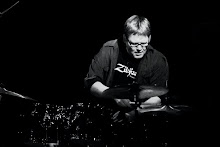One side benefit of playing another instrument is that I've gotten to play with a lot of drummers. What's been fascinating is what I've learned so much about drummers and what other musicians hear when they play. Let me share a few points about this.
1. Other musicians rarely notice velocity.
When I played with drummers the sort of things that struck me were their dynamic control, their awareness of form, the strength of the time etc. When I played with lots of different drummers the only time I noticed their "slick drum stuff' is when they were soloing, and even then, it didn't become the focus of attention.
2. There are lots of different ways to play and be effective.
I've mentioned this before, but the great thing about Jazz is that it supports so many different visions of the music.
I've played with Fab Ragnelli, Adam Bowman, Sam Cino, and Joe Sorbara, to name a few. They all approached the music differently, but all sounded great and more importantly helped me to play the best that I could with my limited piano resources. I would also note they all played the music differently than I would have if I was playing the drums, which is awesome and also the point, isn't it?
3. The rest of the band wants the drummer to be strong.
By this I mean soloists want the time to be solid and not wavering. They want the drummer to play with conviction and to follow through on their ideas. They want a good, pleasing drum and cymbal sound behind them to inspire them to play. If all these elements are present, I find the drummer can play quiet loudly (within reason) at appropriate times in the music and I love it.
it's a lot harder to play with conviction as a soloist if the drummer sounds tentative and afraid.
4. The band wants the drummer to listen.
By this I don't mean to parrot back things the soloist is playing, but to know when to keep the time, and when to break out of it a bit to create interest. The drummer should be listening for ways to create variety in the dynamics, density of sound, colour change etc. The drummer should be also listening to the form of the piece he/she is playing, and find ways to outline that to aid and abet the soloist as well. It's hard playing when one feels the form of the tune is going to get lost all the time, and a good drummer will help keep that together.
I mentioned this before, but it would do us all a lot of good (for many reasons) to double on another instrument. I feel one of the most important results of this different perspective is that it helps us drummers understand what is really important when playing with others. Often we can get sidetracked by the world of drum magazines, drum festivals etc. I'm not knocking any of that stuff, it serves and important function, but as far as pure context goes, if you're trying to play another axe, you'll soon realize how a drummer can help or hinder you.
I expect a big run on the sale of Zithers, Tubas, and Bagpipes as you all find your second instrument!

Can I trade this in for a pan flute?

So when are we going to play that piano/vibes gig and hire Jack DeJohnette to back us up?
ReplyDeleteAs soon as one of us wins the lottery to pay for him!
ReplyDelete